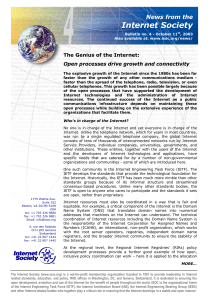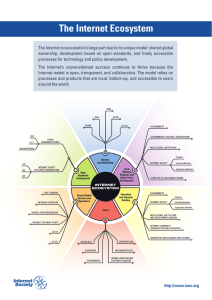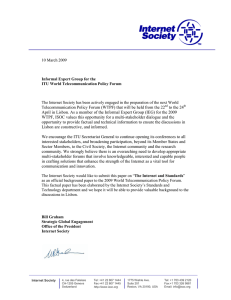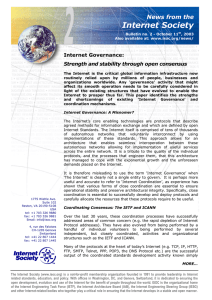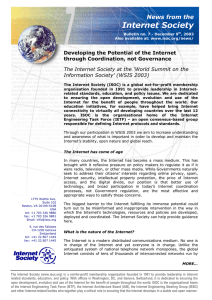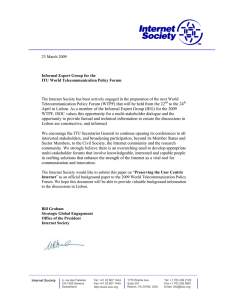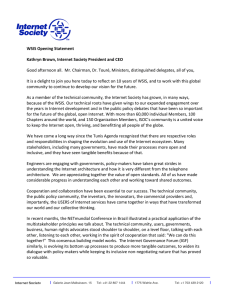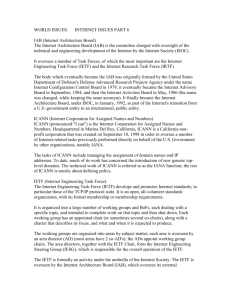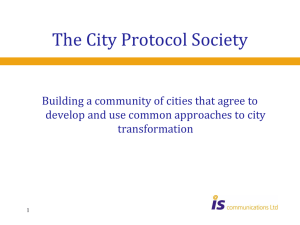Document 13704473
advertisement
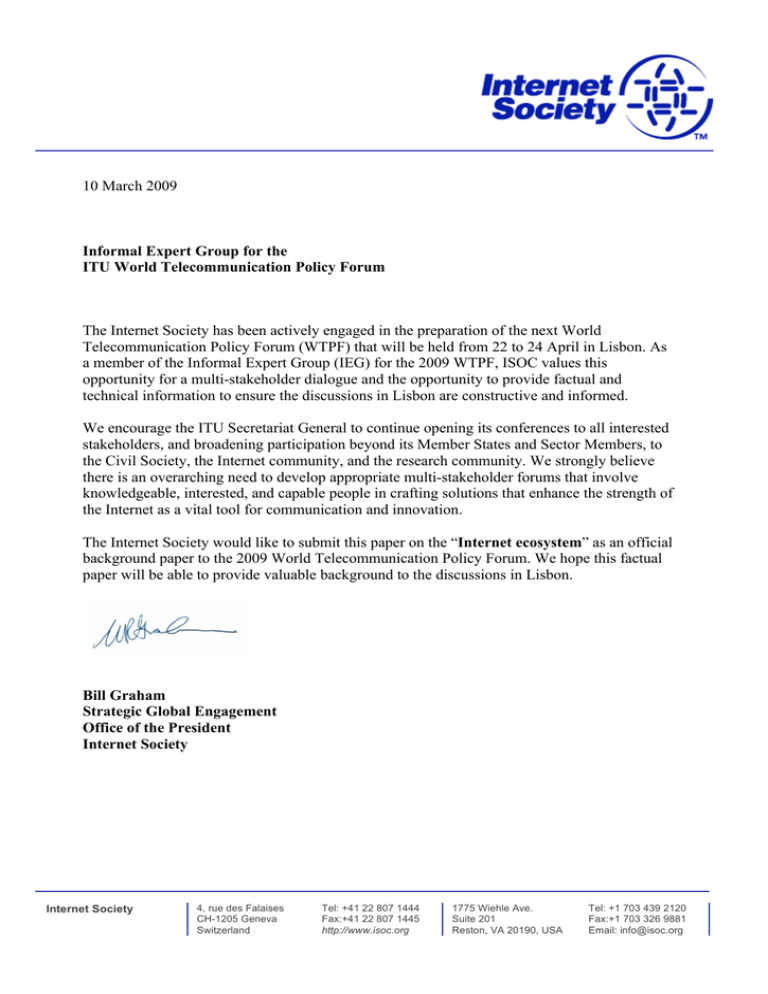
10 March 2009 Informal Expert Group for the ITU World Telecommunication Policy Forum The Internet Society has been actively engaged in the preparation of the next World Telecommunication Policy Forum (WTPF) that will be held from 22 to 24 April in Lisbon. As a member of the Informal Expert Group (IEG) for the 2009 WTPF, ISOC values this opportunity for a multi-stakeholder dialogue and the opportunity to provide factual and technical information to ensure the discussions in Lisbon are constructive and informed. We encourage the ITU Secretariat General to continue opening its conferences to all interested stakeholders, and broadening participation beyond its Member States and Sector Members, to the Civil Society, the Internet community, and the research community. We strongly believe there is an overarching need to develop appropriate multi-stakeholder forums that involve knowledgeable, interested, and capable people in crafting solutions that enhance the strength of the Internet as a vital tool for communication and innovation. The Internet Society would like to submit this paper on the “Internet ecosystem” as an official background paper to the 2009 World Telecommunication Policy Forum. We hope this factual paper will be able to provide valuable background to the discussions in Lisbon. Bill Graham Strategic Global Engagement Office of the President Internet Society Internet Society 4, rue des Falaises CH-1205 Geneva Switzerland Tel: +41 22 807 1444 Fax:+41 22 807 1445 http://www.isoc.org 1775 Wiehle Ave. Suite 201 Reston, VA 20190, USA Tel: +1 703 439 2120 Fax:+1 703 326 9881 Email: info@isoc.org The Internet Ecosystem The Internet is successful in large part due to its unique model: shared global ownership, development based on open standards, and freely accessible processes for technology and policy development. The Internet’s unprecedented success continues to thrive because the Internet model is open, transparent, and collaborative. The model relies on processes and products that are local, bottom-up, and accessible to users around the world. http://www.isoc.org County-Code Top-Level Domains (ccTLDs) ccTLDs are operated according to local policies that are normally adapted to the country or territory involved. http://www.iana.org/domains/root/db/ Generic Top-Level Domains (gTLDs) gTLD registries operate sponsored and unsponsored generic Top-Level Domains according to ICANN policies. http://www.iana.org/domains/root/db/# Governments Federal, state and local governments and their regulators have roles in setting policies on issues from Internet deployment to Internet usage. Governmental Regional Organizations Governmental regional organizations include, but are not limited to, the African Union, the Asia-Pacific Economic Cooperation (APEC), the Asia-Pacific Telecommunity, the Caribbean Telecommunication Union (CTU), the Commonwealth of Nations, the European Union (EU), and the Inter-American Telecommunication Commission (CITEL). Governments sometimes like to coordinate policies related to the Internet for their regions. Internet Architecture Board (IAB) The IAB is chartered as a committee of the Internet Engineering Task Force (IETF) and as an advisory body of the Internet Society (ISOC). Its responsibilities include architectural oversight of IETF activities, Internet Standards Process oversight and appeal, and the appointment of the RFC Editor. The IAB is also responsible for the management of the IETF protocol parameter registries. http://www.iab.org/ Internet Assigned Numbers Authority (IANA) IANA is responsible for the global coordination of the Domain Name System (DNS) Root, Internet Protocol (IP) addressing, and other Internet protocol resources. http://www.iana.org/ Internet Corporation for Assigned Names and Numbers (ICANN) ICANN is a not-for-profit publicbenefit corporation that coordinates the system of unique names and numbers needed to keep the Internet secure, stable, and interoperable. It promotes competition and develops policy on the Internet’s unique identifiers through its coordination role of the Internet’s naming system. http://www.icann.org/ Internet Engineering Task Force (IETF) The IETF is a large, open, international community of network designers, operators, vendors, and researchers concerned with the evolution of the Internet architecture and the smooth operation of the Internet. It is open to any interested individual. http://www.ietf.org/ Internet Community Organizations and Businesses Many Internet organizations and businesses encourage, train, and invest in Internet education and capacity building. Organizations include, but are not limited to, the RIRs, regional and national network operators, and the Network Startup Resource Centre (NSRC), as well as vendors such as Afilias Limited, Alcatel-Lucent, Cisco, IBM, and Microsoft. Network Operators Network Operators include companies that provide access to the Internet. Regional Network Operator Groups (NOGs) provide collaboration and consultative opportunities for local operators and among NOGs globally. Internet Research Task Force (IRTF) The IRTF’s mission is to promote research of importance to the evolution of the future Internet by creating focused, long-term, and small Research Groups working on topics related to Internet protocols, applications, architecture, and technology. http://www.irtf.org/ Other Policy Discussion Forums Organizations include, but are not limited to, the Internet Governance Forum (IGF) and the Organisation for Economic Co-operation and Development (OECD), as well as national consultative forums, industry associations, and civil society organizations. Internet Society (ISOC) ISOC promotes the evolution and growth of the global Internet. Through members, chapters, and partners, they are the hub of the largest international network of people and organizations that work with the Internet. http://www.isoc.org ISOC Chapters ISOC Chapters localize ISOC’s core values and promote the Internet for their local communities. http://www.isoc.org/isoc/chapters/ ISOC Individual Members ISOC Individual Members show commitment to ISOC’s vision. http://www.isoc.org/members/ ISOC Organization Members ISOC Organization Members support and contribute to ISOC and understand the need to take action collectively to ensure the Internet remains open, accessible, trusted, and secure. http://www.isoc.org/orgs/ International Telecommunication Union Telecommunication Standarization Sector (ITU-T) The ITUT regularly convenes specialists drawn from industry, the public sector, and R&D entities worldwide to develop technical specifications that ensure that each piece of communications systems can interoperate seamlessly with the myriad elements that make up today’s complex ICT networks and services. http://www.itu.int/ITU-T/ Internet Exchange Points (IXP) Regional and national IXPs provide physical infrastructure that allows network operators to exchange Internet traffic between their networks by means of mutual peering agreements. Multilateral Institutions and Development Agencies Multilateral institutions include organizations that have multiple countries working in concert on Internet issues for policy development, education and capacity building. Organizations include, but are not limited to, the International Telecommunication Union (ITU), the ITU’s Development Sector (ITU-D), the United Nations’ UNESCO, and the World Intellectual Property Organization (WIPO). Regional Internet Registries (RIRs) RIRs oversee the allocation and registration of Internet number resources within a particular region of the world. Each RIR is a member of the Number Resource Organization (NRO). RIRs include AfriNIC, the Asia Pacific Network Information Centre (APNIC), the American Registry for Internet Numbers (ARIN), the Latin American and Caribbean Internet Addresses Registry (LACNIC) and the RIPE Network Coordination Centre. http://www.nro.net/ Root Servers DNS root name servers reliably publish the contents of one small file called a root zone file to the Internet. This file is at the apex of a hierarchical distributed database called the Domain Name System (DNS), which is used by almost all Internet applications to translate worldwide unique names like www.isoc.org into other identifiers; the web, e-mail, and other services use the DNS. http://www.root-servers.org/ Service Creators/Vendors Service Creators and Vendors provide software applications and experiences that utilize the Internet. Specialized Standards Bodies Many organizations focus on specialized standards; some play key roles in the Internet. These organizations include, but are not limited to, the European Telecommunications Standards Institute (ETSI), the Identity Commons, the IEEE Standards Association, the ISO ANSI, the Liberty Alliance Project, Open Source Communities, and the Organization for the Advancement of Structured Information Standards (OASIS). Universities and Academic Institutions Historically and continuing today, academic institutions play a critical role in educating students and business people. They also prototype and demonstrate hardware and software solutions that benefit the Internet. Users People and organizations that use the Internet or provide services to others via the Internet. World Wide Web Consortium (W3C) W3C is an international consortium where Member organizations, a full-time staff, and the public work together to develop Web standards. http://www.w3.org A nonprofit organisation, the Internet Society was founded in 1992 as a leader in promoting the evolution and growth of the Internet. Through our members, chapters, and partners, we are the hub of the largest international network of people and organisations that work with the Internet. We work on many levels to address the development, availability, and technology of the Internet. 1775 Wiehle Avenue, Suite 201, Reston, VA 20190-5108, U.S.A. +1 703 439 2120 4, rue des Falaises, CH-1205 Geneva, Switzerland +41 22 807 1444 10/30/08
